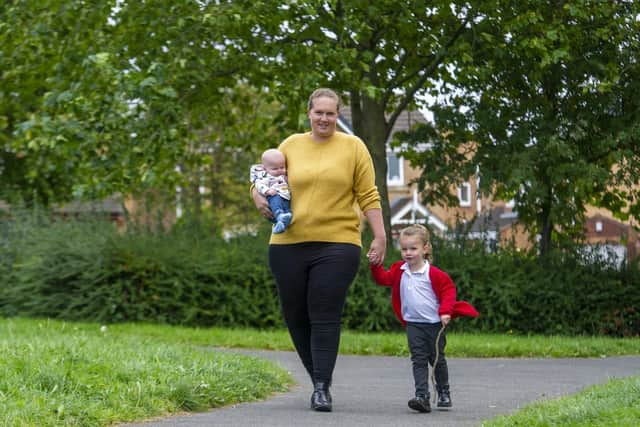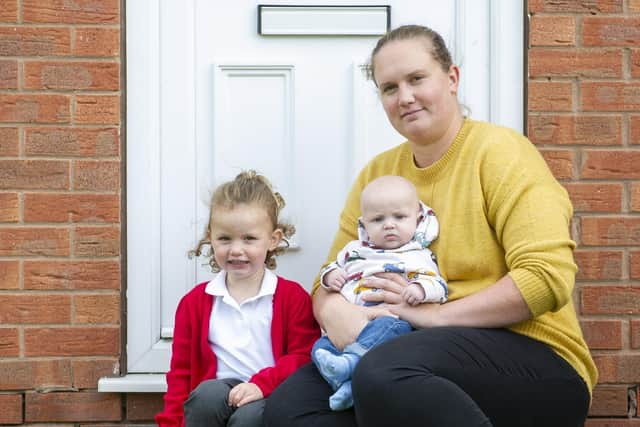“The experience, well I don’t have the words for that” - a bereaved mum on how she had to face heart-wrenching scans alone
and live on Freeview channel 276
The reduction in antenatal services, face to face health and midwife appointments and dads and partners not being allowed to attend scans has also led to fears that there will be a rise in postnatal depression cases.
In a three day series, the Yorkshire Evening Post shines a spotlight on loneliness and how that can affect everyone from a few days old to being into your eighties and beyond.
Advertisement
Hide AdAdvertisement
Hide AdLeanne Bennett gave birth to her son Finley on June 9 this year and already knew she would struggle with the pre and post pregnancy experience after one of her twins, born in 2017, was stillborn.


Leanne, of Gypsy Lane, Castleford experienced anxiety and depression after her pregnancy with the twins and cites mum and baby groups as being one of the most important tools in helping her deal with it.
She said: “I relied on the groups as a way of just being normal. I didn’t tell them about Noah, nobody was putting on the pity eyes and saying ‘it must be awful’. I was one of them - just going to a group to chat about her being up all night or finally rolling over. It was a fresh start with my baby.
“I have had anxiety and depression for years and I was aware of it and kind of expected it with the first pregnancy but it was just after Maddison’s first birthday, when I went back to work, that I started feeling down. I had far too much time to think about things.”


Advertisement
Hide AdAdvertisement
Hide AdAfter five months she was barely able to get out of bed and eventually sought help through health care arranged via her employment. However, throughout her pregnancy with Finley she anticipated the same struggle, but that was compounded by the restrictions surrounding partners attending hospital appointments and visiting times following the birth.
She said: “My partner could not come to the scans, they were not enjoyable for myself for obvious reasons, as that is when we first learned (about Noah). I found it really difficult to not have a support there, you expect the worst.
“Finley is fine and we are really grateful for that, but the experience, well I don’t have the words for that. Even my partner said how much of a struggle it is. They are just waiting for that phone call.”
New group
Leanne, 27, knew how much she had benefited from having other mums to talk to and that online and Zoom groups were not the same as having somewhere to go and get dressed up for, so decided to start her own group.
Advertisement
Hide AdAdvertisement
Hide Ad“When I had Finley I knew I would struggle, there were no groups available, I had to take Maddison out of the creche because of the risk of her coming home to me while I was pregnant and it was then that I decided I could not keep battling on and needed to help myself as much as other people.
“When you could not mix households, it was literally just me, a toddler and a baby. My partner is a wagon driver so he was out and about. You have to get up for something and go out of the house.”
It started as a facebook page, called Castleford and Pontefract Lockdown Mums, and was a support group where mums could ask others what to expect at hospital appointments and such like. When Finley was ten weeks old and the restrictions had changed on meeting outdoors, the group had its first face to face meeting at Pontefract Park where 18 mums and babies turned up.
She has made firm friends with other members of the group and has been on shopping trips and it now meets, with socially distanced tables and limited numbers, at a sports and social club in Castleford where parents can just chat over tea and coffee.
Advertisement
Hide AdAdvertisement
Hide AdEven when her children have grown out of it, Leanne hopes that the group will carry on.
She added: “I realised at that park just how necessary it was and I definitely was not just feeling it myself. I hope that it will keep going.”
However, not all mums are aware of their perinatal mental health, or able to take control of it, and community groups, such as Leanne’s, play a vital part, says a help group in Leeds.
Expert
Helen Wilson, deputy chief executive, of Women’s Counselling and Therapy Service which is based in Leeds said: “We have a whole range of women that won’t recognise that is what is going on. That loss of opportunity to have close involvement with friends and family, the loss of opportunity to build relationships with other new parents who might flag for you ‘I don’t feel or am coping in the same way’, that experience of women or mums to recognise something is not right is not available at the moment.”
Advertisement
Hide AdAdvertisement
Hide AdShe said the way restrictions are enforcing a different kind of pregnancy should also not be underestimated.
“For most of us, when you have a baby, you have a personal expectation of what that is going to be like. Maybe your sister will come round, the following day your friends will come and meet your baby, you will go to this and that and do all these things. And it is not like that, you have isolation, you are on this road thinking ‘I don’t know it and I don’t know what it looks like’.
“We would like to see a focus on women and perinatal mental health as part of the restrictions and legislations that are being made at the moment.
“You can go to a pub with six other people but could not have had your partner at the scan. That compounds that feeling for women that their needs are being overlooked and they are of secondary importance.
Advertisement
Hide AdAdvertisement
Hide Ad“For that group to be considered and their specific needs to be considered - if we can address that, then the potential for post natal depression would be less.”
A message from the Editor:
Leeds has a fantastic story to tell - and the Yorkshire Evening Post has been rooted firmly at the heart of telling the stories of our city since 1890. We believe in ourselves and hope you believe in us too. We need your support to help ensure we can continue to be at the heart of life in Leeds.
Subscribe to our website and enjoy unlimited access to local news and information online and on our app. With a digital subscription, you can read more than five articles, see fewer ads, enjoy faster load times, and get access to exclusive newsletters and content. Click here to subscribe.
For more details on our newspaper subscription offers, click here.
Thank you
Laura Collins
Comment Guidelines
National World encourages reader discussion on our stories. User feedback, insights and back-and-forth exchanges add a rich layer of context to reporting. Please review our Community Guidelines before commenting.